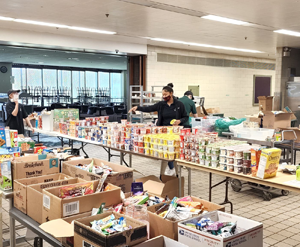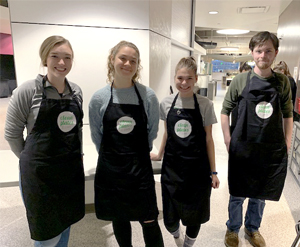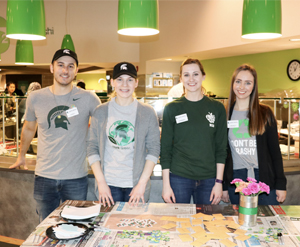RHS Sustainability Vision Statement
Residential Hospitality Services (RHS) strives to ensure MSU’s long-term sustainability through innovative and balanced strategies that support stewardship, fiscal responsibility and partnership.
Program Overview
During the academic year, the MSU Food Stores procurement team focuses on implementing initiatives emphasizing the triple bottom line: reducing costs, limiting waste, and decreasing energy consumption. In addition to promoting a high-quality supply chain, the department employs strategies to enhance outreach and education, helping students and team members further their commitment to social responsibility.
Culinary Services also prioritizes local sourcing, water conservation, energy efficiency, and zero waste principles, including reuse, reduction and recycling within its facilities.
The information below provides a high-level overview of sustainability efforts in Culinary Services. For more details on university and divisional programs, please visit the following pages:
- MSU Sustainability: sustainability.msu.edu
- RHS Sustainability: sle.msu.edu/sustainability
Partnering for a Greener Future
Michigan State University is working toward climate neutrality by mid-century, doing our part to address the global climate crisis within our community and on campus. Unified in our goals to maximize the impact of our campus while minimizing our footprint, we use our collective knowledge, intuition, drive and passion to address sustainability challenges in everything we do. The MSU Surplus Store and Recycling Center (SSRC) partnership helps divert tons of materials from landfills each year, ensuring that usable items and recyclable materials are put to good use.
- MSU Recycling
The SSRC offers comprehensive services that work together to minimize MSU’s landfill contributions. From surplus item redistribution to recycling and repurposing programs, the SSRC plays a key role in achieving the university’s Strategic Plan for Sustainability (2024–2027). - Pack Up, Pitch In Program
Since 1996, MSU students have participated in Pack Up, Pitch In, a sustainability initiative held during residence hall move-out. The program encourages students to donate or recycle unwanted items instead of sending them to landfills. - Community Kitchens
Several residence halls and 1855 Place apartments on campus have community kitchens for students and staff with nearby recycling. Additionally, the 1855 Place building, which includes community, office, residential, and retail space, has extensive recycling stations for paper, metal, glass and plastic, and a composting bin.- Learn more about community kitchens on the Live On website.
- Reusable Bottles
Water bottle filling stations are located throughout campus to encourage the community to fill reusable bottles instead of purchasing bottled water. See the MSU Infrastructure Planning and Facilities (IPF) bottle filling stations map.
Nutrition and Affordability
Affordable and Healthy Dining Options
- Student dining plans provide an affordable option for Spartans to dine on campus while studying at MSU. On-campus students choose the Silver, Gold or Platinum dining plan. They pay one price for the semester and have unlimited access to all-you-care-to-eat dining halls. Additionally, they receive 12 Combo-X-Change meals per week at retail locations and foodservice partners like Panera Bread and Subway.
- Students enjoy unlimited access to all-you-care-to-eat dining halls, which allows them to make flexible meal choices to match their schedules. They can choose where and which menu options to try, encouraging healthier eating decisions.
- In addition to rotating menu options, MSU offers an online tool called MSUtrition. Students and guests can filter the information by food allergies and dietary needs and view detailed ingredients for items served in the dining halls.
- Students who need additional information or guidance can contact our MSU’s Registered Dietitians for support. They can provide personalized support and are available to meet with students.
Off-campus Students
- Students living off-campus can purchase an unlimited dining plan (Silver, Gold or Platinum) over the phone by calling 517-355-2274.
- We also offer a Block Plan option, where meals can be purchased in bundles of 10. This plan offers students a discounted rate for meals purchased at on-campus dining locations. These meals may be purchased online.
- For more information, please visit our dining plan page.
 Food Donations
Food Donations
Michigan State University is dedicated to advancing the United Nations’ Sustainable Development Goals (SDGs) through various initiatives and partnerships. In support of SDG Goal #2, Zero Hunger, MSU actively works to combat food insecurity by donating food to the campus and local communities.
MSU collects perishable and non-perishable foods from retail locations throughout the year. These donated items are distributed through various programs and support the MSU Student Food Bank and the Greater Lansing Food Bank. This regional network distributes food to those in need across the area.
Non-perishable items are also gathered from retail locations and distributed to both food banks, extending MSU’s impact to the broader Greater Lansing community.
Local Sourcing and Foodservice Providers
- Culinary Services is committed to sourcing food as locally as possible, working to strengthen our supply chain and focusing on triple-bottom-line initiatives, people, planet and profit.
- MSU considers its on-campus production capabilities before exploring off-campus options.
- We have an on-campus bakery, MSU Bakers.
- We have established strong partnerships with the MSU Student Organic Farm, Bailey GREENhouse and Urban Farm, MSU Dairy Store and MSU Meat Lab to reduce costs, minimize waste and decrease energy consumption.
- The MSU Student Organic Farm (SOF) is housed in Culinary Services within the RHS division, providing the farm with a broader campus-wide platform for education and engagement.
- The 20-acre, certified organic year-round teaching and production farm offers an immersive, hands-on farming experience for undergraduate students, Organic Farmer Training Program participants and volunteers.
- The SOF also collaborates with MSU faculty to offer courses in organic farming, internships, interdisciplinary experiential educational activities and research opportunities.
- If we can't source hyper-locally from on-campus, we look within the state and the surrounding states. We have a wide variety of local and regional vendor partners to assist with sourcing as locally as possible.
- The Sustainable Food Procurement Guide provides detailed information about our food sourcing, sustainability efforts, best practices and considerations in specific purchasing categories.
- MSU is a fully engaged institution in environmental stewardship initiatives. All business partners are expected to support and practice the university’s vision. Below are common sustainability and environmental stewardship criteria applied to food service provider contracts:
- MSU prefers firms whose business culture supports sustainable environmental practices. We evaluate the documentation of a firm’s sustainability initiatives and economic impact within Michigan.
- MSU prefers firms whose business culture supports human rights initiatives. We evaluate the documentation of a firm’s human rights initiatives.
- MSU prefers environmentally sustainable products. When applicable, we evaluate a firm’s use and documentation of third-party certified products that are available.
 Operations and Environmental Efficiencies
Operations and Environmental Efficiencies
Sustainable Living and Dining in the Brody Neighborhood
The Brody Neighborhood, home to six residence halls, is proud to be fully LEED certified, a testament to MSU’s commitment to sustainable building and operations. Within the neighborhood, Brody Square residential dining holds a LEED Silver certification and strongly focuses on environmental responsibility.
Food Waste Reductions
- Brody Square features a closed food loop and system designed to reduce waste and conserve resources:
- The Brody food pulper processes post-consumer food waste, significantly reducing its volume. The food waste is sent to the MSU south campus anaerobic digester, which converts food and farm waste into renewable energy used on campus.
- The system uses greywater technology, conserving water while efficiently managing waste.
Closing the Food Loop
- Hammond Farms of Mid-Michigan is a local composter we use for further sustainable processing.
Pre-consumer food scraps are collected and sent to the Food Scrap Worm Composting (Vermicomposting) Project where worms break down the waste into nutrient-rich compost.- Vermicomposting returns vital minerals and organic matter from food scraps to farms and gardens. This promotes healthy soil and diverts tons of food waste from landfills each year. Learn more about worm composting.
The Benefits of Trayless Dining
All on-campus dining halls are trayless to reduce food waste and support the university's goal of diverting fewer materials to landfills. Removing trays also conserves water and energy used in cleaning them.
 Academic Integration and Collaboration
Academic Integration and Collaboration
RHS contributes to student success at MSU through integration with academic programs. Connecting with the educational curriculum provides students hands-on experience and living-learning laboratories to enhance their engagement. Several examples are highlighted here:
- Human Nutrition and Food (HNF) Courses
We partner with the Department of Food Science and Human Nutrition to help educate Spartans and provide hands-on experiences that extend beyond the classroom. HNF students in the Food Service Management course plan and execute special food events in the fall and spring semesters. - Residential Initiative on the Study of the Environment (RISE)
The Residential Initiative on the Study of the Environment (RISE) is an interdisciplinary living-learning program that empowers students to explore and promote sustainability and environmental stewardship. RISE partners closely with several RHS units, including Culinary Services, to support real-world sustainability initiatives. Working alongside RHS teams, RISE students gain practical experience while contributing to MSU’s broader sustainability goals.- Through these collaborations, students engage in hands-on projects aimed at:
- Reducing food waste
- Lowering energy and water usage
- Minimizing solid waste sent to landfills
- Through these collaborations, students engage in hands-on projects aimed at:
- Learn more: RISE website
 Outreach and Engagement
Outreach and Engagement
RHS is crucial in providing students with engagement opportunities that enhance their learning experience beyond the classroom. These co-curricular opportunities and learning experiences are recognized through the Center for Community Engaged Learning and the Spartan Experience Record, administered by the Associate Provost for Undergraduate Education.
Student Engagement
- Eco Rep Program
RHS offers a student Eco Rep Program to engage Spartans across campus. Interested on-campus students apply and are interviewed to provide reps for the 27 undergraduate residence halls. Once onboarded, Eco Reps coordinate and assist with sustainability events, educate peers, implement practices within their building, and coordinate and monitor recycling.- For more information, email sustainability@rhs.msu.edu
- Registered Student Organizations
Throughout the fall and spring semesters, RHS partners with student groups to support their efforts and events. One example is MSU’s student chapter of Slow Food, which hosts a variety of engagement opportunities, including cooking demonstrations, farm volunteering and skill workshops.- If you're interested in learning about the RSOs and are available to join, please visit the Student Life website.
- Spartan Student Food Council
Members support MSU Culinary Services in improving the dining experience at MSU by providing valuable feedback and insights and establishing optimal dining practices for the MSU community.
Team Member Engagement
- Eco Ambassador Program
Selected full-time Culinary Services team members volunteer to serve as Eco Ambassadors with our Culinary Services units. In this role, they act as sustainability champions and peer educators, identifying opportunities to reduce waste and lower costs and engage coworkers in sustainable practices. Each Eco Ambassador receives a toolkit with resources to support their efforts and a sticker to display their role proudly. There are 60 Eco Ambassadors across MSU’s Culinary Services, including MSU Bakers, Spartan Linen Services and MSU Food Stores. - Internship Program
The RHS Summer Internship Program is designed to provide full-time team members with valuable professional development opportunities. Through hands-on experience in various division areas, participants can explore new career paths and build key skills. Internship tracks include sustainability, project management, team supervision and more.- Sustainability interns play an active role in advancing green initiatives for RHS, including:
- Developing best practices
- Promoting energy and material conservation
- Conducting assessments
- Supporting food waste reduction programs
- Assisting with sustainability-related training
- This program empowers team members to grow within RHS while contributing to meaningful projects that support MSU’s commitment to sustainability and operational excellence.
- Sustainability interns play an active role in advancing green initiatives for RHS, including:
If you have any questions regarding our efforts, please contact RHS Sustainability at sustainability@rhs.msu.edu.


